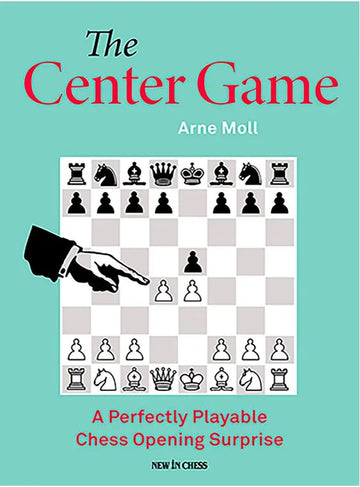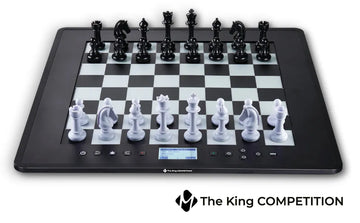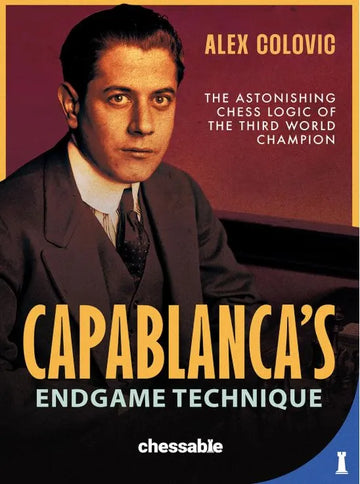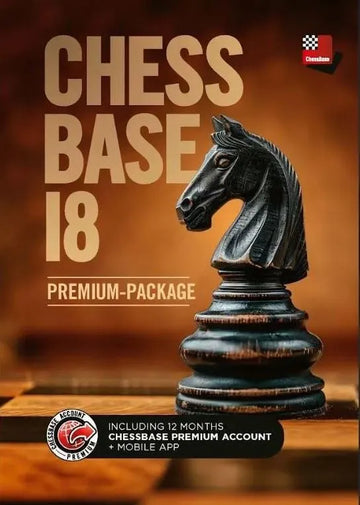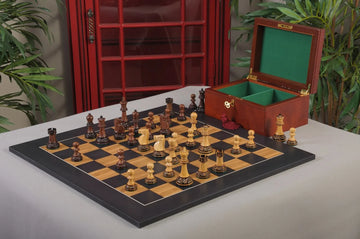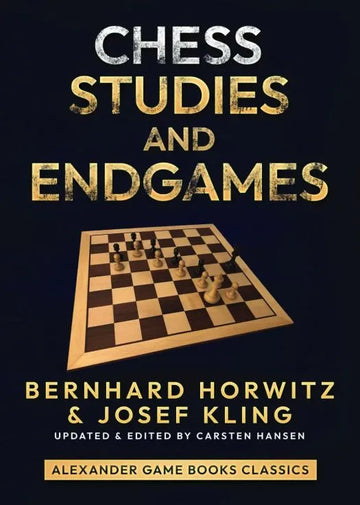10 Must Have Intermediate Chess Books
You’ve learned the basics of chess—piece movement, simple tactics, and maybe a few opening ideas—but now you’re looking to go from beginner to intermediate. You may have gone from 100 ELO to 1000 ELO but are getting stuck. The jump from beginner to intermediate can feel like a steep climb, full of complex positions, tricky calculations, and big blunders, but the books on this list will guide you toward improvement.
The best chess books teach you more than moves. They help you think like a stronger player. You will refine your strategy, sharpen your tactics, and deepen your understanding of chess. Whether you want to continue your tactics journey, learn from master games, master basic openings and endgames, or learn the fundamentals of chess strategy, the books on this list will provide you with the tools to do so.

1. Chess - 5334 Problems, Combinations, and Games
If you have already finished an introduction to chess tactics like Everyone's First Chess Workbook, then here is your next book of puzzles. The over 5000 unique instructional situations will keep you thinking for a long time. Even if some of the problems are difficult for you now, use them as longer calculation exercises. Getting through over 5000 puzzles is not something to do in one sitting. Take your time and use this as a resource that will last you through this part of your chess learning career. Don’t rush, and take advantage of these great problems.

2. Winning Chess Strategies
Out of any other chess book on this book list or beyond, this book might be my favorite. I return to it often as a learner and chess teacher. This Yasser classic, Winning Chess Strategies, is a great next step for your chess learning. If you have already completed some beginner books, this should be your next purchase. True to its name, this book introduces you to chess strategy and the strategic aspects of the game. While beginner books cover the fundamentals of chess—tactics, patterns, and essential principles—this one takes things further. Strong tactics form the foundation of good play, but strategy is what turns that foundation into a winning approach. Understanding where to place your pieces, navigating the middle game, and thinking beyond immediate threats are all key lessons Yasser explores, making this book an essential next step in your chess journey.

3. Silman's Complete Endgame Course
Jeremy Silman, co-author of Winning Chess Strategies, has written one of the most comprehensive endgame books available, offering something for chess players of all levels. While complete beginners might not need to tackle the entire book right away, Silman’s Complete Endgame Course is an excellent resource for building confidence in endgame fundamentals. Depending on your skill level, you may only go through the first few chapters at first, but the rest will be there for you as you progress. Even those early chapters offer a significant advantage, enabling you to approach basic endgames with greater clarity and confidence. As you improve and become an intermediate player, you can go through more of this book and learn even more about endgames.

4. Play Like a Champion
Chess tactics can sometimes feel bland and boring. One way that I have found to make tactics more interesting while learning is to know the context in which the tactic was played! In Jennifer Shahade’s Play Like a Champion, she highlights the careers and brilliant tactics of some of the most skilled and influential chess players in history, including the first Women's World Champion, Vera Menchik, Grandmaster Hou Yifan, and Phiona "Queen of Katwe" Mutesi. Understanding the history and context of these tactics is a great way to elevate your play to the next level while expanding your knowledge of the game.

Openings
Improving your chess from the beginner level up to intermediate can feel like the time to learn more openings. Be warned. Just adding more opening study to your chess knowledge will not help you make the improvement jump you are looking for. Improving in the game of chess is about understanding the game, not about memorizing moves. However, learning more about an opening can help you be more comfortable starting to play chess. If that is the case, then feel free to study enough openings so that you can be confident in your games.
5. Winning Chess Openings
Instead of recommending some opening book about some random variation, I will recommend Yasser Seirawan’s Winning Chess Openings, one book will tell you how to move forward with your opening study. Even if you feel that you have a decent grasp of opening principles, reading a book like this from Yasser is an excellent guide for building confidence in the opening phase of the game. Many players struggle to enjoy chess when they feel uncertain at the start, but understanding key opening principles not only helps you survive the early moves but also shapes your overall strategy. This book provides a solid foundation in openings while showcasing Yasser’s engaging writing style.

What If I Want To Learn A Specific Opening?
Yasser’s book will give you a good baseline and may even introduce you to some openings that you like. Once you know a specific opening that you want to learn more of, I recommend then looking for a book about that opening. A modern book should have up-to-date information and be able to teach you the best lines.
6. How to Reassess Your Chess - 4TH EDITION
Silman already made my list earlier with his endgame book, but How to Reassess Your Chess will open up a new level to your chess understanding. This book is a good example of the need to know how to play your scales before you try to play Beethoven. Reassess Your Chess may not exactly be Beethoven, but if you do not have a good grasp of the basics of chess, then what is there to reassess?
This book takes Silman’s famous concept of imbalances and builds on them, making it an essential guide for players rated 1400 to 2100 and a tool I have used as a chess teacher as well. It systematically explores the fundamentals of imbalances, ensuring a thorough understanding of each concept. By the end, readers gain a level of positional understanding that the beginner player lacks.

7. Logical Chess - Move By Move
In Logical Chess Move by Move, Irving Chernev provides an incredible guide to improving your chess for players looking to grow their game from beginner to intermediate and beyond. Through 33 detailed games, he explains the reasoning behind every move, helping readers understand how to use their pieces and win chess games. First published in 1957, I have heard many great chess players cite it as a key resource in their early development. Chernev’s clear, entertaining writing style and focus on strategy make this book a must-read for anyone serious about improving their chess skills. True to its name, the book includes richly annotated games and explanations of each move, all drawn from real games between masters and amateurs.

Grandmaster Games
Studying tactics, openings, and endgames can help your chess, but studying grandmasters' chess games helps improve your understanding of advanced strategies, decision-making, pattern recognition, and positional play. Every chess coach will tell you that if you want to really improve, look at grandmaster games. Now, where do we find those games? You could look at top games played yesterday, but for the curated best of the best, look to some of these books with great master games.
8. Bobby Fischer - My 60 Memorable Games
For the beginners, I recommend Bobby Fischer Teaches Chess, a simple walkthrough of how the pieces move and basic rules. For the intermediate player, however, I think starting out your study of master games with My 60 Memorable Games is a strong choice.
In this chess classic, Bobby Fischer guides readers through 60 of his most instructive and captivating games, including the famous "Game of the Century" at the age of just 15. Bobby Fischer selected 60 of his best games My 60 Memorable Games. He provides detailed commentary on each game, explaining the moves and the reasoning behind them. Bobby Fischer is widely regarded as one of the greatest chess players of all time, meaning we can learn from his games! His victory in the 1972 World Chess Championship, in which he defeated Boris Spassky, marked a defining moment in chess history and brought the game into the global spotlight. These 60 games capture his career.

9. Capablanca's Best Chess Endings
I love this book because it does what most good chess moves do: two things at once. It gives you entire great chess games from grandmasters, but then it hones in on how their decisions throughout the game affect the resulting endgame. You can use this book both to study masters' games and to learn good endgame principles from one of the greatest endgame players of all time, Capablanca.
Originally published in 1982, Capablanca's Best Chess Endings by Irving Chernev showcases 60 complete games, thoroughly annotated, that highlight the Cuban master's refined endgame play. These games, featuring legendary opponents like Alekhine, Lasker, Marshall, Nimzowitsch, and Reti, demonstrate Capablanca’s ability to turn win incredible endgames that we can still learn from today.

10. The Mammoth Book of the World's Greatest Chess Games
The Mammoth Book of the World's Greatest Chess Games is an invaluable resource, offering 125 carefully selected games deemed the best of all time by a group of British experts. Each game is accompanied by insightful context and analysis, providing a deeper understanding of the moves. This book is another that lives up to its name. It is a mammoth! You will need plenty of time to work through these games, especially if you are playing through them on a board, which is a great way to improve. Grab a few friends, get a chess board, and play through any number of these great games from amazing players of the past.

Frequently Asked Questions
The best book to study chess is the one that helps you to love the game and want to play more! For me that is Winning Chess Strategies and How to Reasses Your Chess, those books have inspired me to play more chess in my life, and I think they can do the same for you.
A 700 chess rating means that you are better than most average people at chess! You can probably beat your dad or your cousin who plays once a year, but if you want to improve beyond that, then these books are for you.
Any book on this list will suit you well as an intermediate chess player and learner. Whether you want to learn from masters' games or just learn endgames, Capablanca's Best Chess Endings is a great book for studying the different parts of a chess game.
No one book can teach you all of the openings in chess. The best way to learn openings and to find good opening books is to pick which openings you want to play and then look for recommended books about that particular opening. For good general opening principles, I recommend Winning Chess Oppenings, which is number 5 on my list.
If a certain book interests you, try it out! Just because you are not ready to fully understand a certain book, doesn’t mean you can’t learn from it. Just be patient with yourself as you go.


